Aristotle Biography 7: Alexander the Great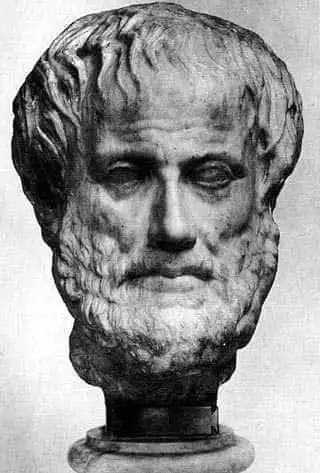 The life and time of the Greek PhilosopherLeaving the Academy
Plato died in the spring of 347, and the same year Aristotle left the Academy. It is easy to connect the events, concluding that Aristotle left after his teacher had died, but that is not necessarily the case. Ingemar Düring, along with some other scholars, claims that Aristotle left before his teacher's death, as a result of a hightened anti-Macedonian mood in Athens at the time.
But he left together with Xenocrates of Chalcedon in Asia Minor, one of Plato's most senior students, who was also not a citizen of Athens, but with no link to Macedonia or its ruler. Why would Xenocrates need to leave at a time of anti-Macedonian uproar? Some sources imply that Aristotle might have left the Academy in frustration over not being elected as its next head. Diogenes Laertius is one to mention it as a possibility. That would mean Aristotle stayed until after his teacher's death. As a reason for his departure, though, it makes very little sense. Speusippus, who was to succeed Plato as the head of the Academy, was an obvious choice for the position, even long before Plato's demise. He was a senior to Aristotle by more than twenty years, having been with the school since its start. He was also Plato's nephew, which was certainly of quite some importance. He seems to have been pretty much Plato's right hand, through all the time since the founding of the Academy in 388, accompanying him to Syracuse in the complicated affairs Plato had there, and so forth. Speusippus must have been such an evident choice, it can neither have surprised nor upset Aristotle. Additionally, leadership of the school seems to have included ownership of its facilities, and Aristotle,who was not a citizen of Athens, was by law forbidden to have property in the city.
Still, it may have given Aristotle an incentive to leave the Academy. Even if he did not question Speusippus' right to the position, Aristotle was likely to feel that Speusippus had little to teach him, and the Academy may have lost quite a lot of its flare with Plato gone. At 37 years, Aristotle was near his age of flourishing, which must have encouraged him to try and find a platform or career of his own. Even if Plato had not died, Aristotle might have felt compelled to move on. Together with Xenocrates, Aristotle traveled to Atarneus, in Asia Minor, where an old friend of the Academy, Hermias, was the tyrant. Hermias had started as a eunuch-slave to Eubulus, a banker who was ruling Atarneus, and won his trust to the extent that he was not only given his freedom, but also eventually the rule of Atarneus. Their intention was to start a school in Assos near Lesbos, sort of an annex to the Academy, with the eager help of Hermias, who admired Plato and had visited the Academy. The school may have commenced before their arrival, but was in need of good teachers. In view of Xenocrates' seniority, it is likely that he was to be in charge of the school, and Aristotle to assist. This is also implied by the fact that Aristotle left for Lesbos, only about two years later. Their departure from Athens may have been the result of Xenocrates not being elected to succeed Plato, and his need to find a school of his own, while Speusippus took over the Academy. If so, again it makes the most sense if they left Athens after Plato's death, not before it.
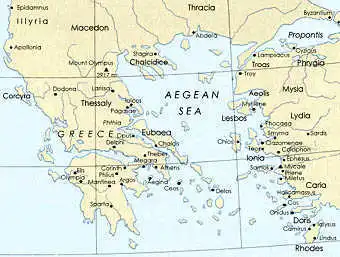 Map of antique Greece.
Aristotle got his wife in his late 30s, which was what he regarded as the ideal age for a man to marry. Since Aristotle also recommended the woman to be about 18, this may very well have been Pythias' age at the time of their marriage. They had one daughter, also named Pythias, perhaps indicating a true passion between husband and wife. Their marriage was not to be very long. Pythias died after about ten years. Aristotle was later to find another companion, Herpyllis, from his hometown Stagira. He never married her, perhaps because Aristotle had nothing to gain by it, if there was neither dowry nor distinguished relations, but they had a son, Nicomachus, named after Aristotle's father. There's an interesting pattern showing in the names of the children: the daughter with her mother's name — something unlikely to be solely or at all the will of the mother — and the son with the name of Aristotle's father. Would he have preferred, if bold enough, to give the son his own name? It seems kind of possessive, but it can also be decisions made by a person with strong affection for his kin. In Assos, Aristotle started extensive zoological and botanical fieldwork with students at the school. This project of natural science was to continue for the rest of his life. Only about two years after Aristotle had arrived, in 345, he moved with his family and some of the students to Mytilene on the nearby island Lesbos. Here, he stayed for a year, continuing his fieldwork. With Aristotle at this time — unclear from what date — was Theophrastus, native of Eresus on Lesbos, who was to follow him from there on, and to succeed him at the Lyceum. They also traveled to Stagira, Aristotle's hometown, but it is not known when — probably about a year after arriving to Lesbos, which would then be in 344.
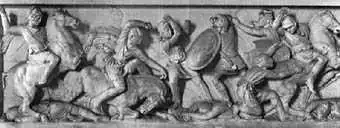 Sarcophagus with Alexander to the left and Hephaestion to the right.
AlexanderIn 343 or 342, king Philip II invited Aristotle to his court, where he was employed as a tutor to Philip's son Alexander, 13 years old at the time. Plutarch is the source dwelling on this tutorship the longest, in the section of Parallel Lives, which gives a glorified biography of Alexander. Plutarch has his version of how the tutorship came to be: Alexander had mastered the fierce horse Bucephalas, where no one else could, in a mighty battle of wills between them.
After this, considering him to be of a temper easy to be led to his duty by reason, but by no means to be compelled, he always endeavored to persuade rather than to command or force him to anything; and now looking upon the instruction and tuition of his youth to be of greater difficulty and importance than to be wholly trusted to the ordinary masters in music and poetry, and the common school subjects, and to require, as Sophocles says, The bridle and the rudder too, he sent for Aristotle, the most learned and most cerebrated philosopher of his time
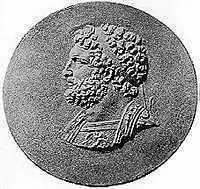 Philip II.
It is not sure how long his tutorship lasted. Dionysius of Halicarnassus says eight years, which would be all the time until Aristotle returned to Athens and opened the Lyceum. It may also have lasted only three years, until 340, when Philip was away at war and Alexander ruled as king at his absence. Or until the death of Philip in 336, when Alexander became king. If Aristotle's tutorship ended long before 336, he probably stayed in Stagira until 335, when going to Athens to open his school at the Lyceum. But if so, one has to wonder — why did he at all go to Athens, after several years in Stagira, his hometown? On what impulse? It seems more likely that Aristotle would decide on Athens right after his tutorship was ended. Then dates match, since Alexander became king in 336, surely by then with no time or need for tutoring, at the age of twenty. It was Philip, his father, who appointed Aristotle, and not until his death would it have been comfortable for Alexander to put an end to the appointment. Aristotle went to Athens in 335. That year would be just enough time to prepare the venture, pack his bags and go. Some scholars, such as Jaeger and Grayeff, even suggest that Aristotle was never the tutor of Alexander at all. Well, indeed it sounds too good to be true — one of the foremost philosophers of all time, teaching one of the greatest conquerors of all time. The thought may have struck some later antique historians, when observing the time in Aristotle's life not well accounted for, fitting that of young Alexander so well for the task. Aristotle having a link to the Macedonian court was established already by his father Nicomachus, as a medic for Alexander's grandfather. Grayeff argues that Plutarch, the main source to Aristotle being the tutor of Alexander, in another section of his Parallel Lives names several teachers of Alexander, but not Aristotle. There is nothing odd at all in the prince having a number of tutors, and changing them now and then, so if Plutarch mentions Aristotle at one place and not the other, it may simply be a question of what time of his life Plutarch talks about, or a way of handling Aristotle with particular respect, by not mixing him in with the other tutors. If we are to believe that Nicomachus was indeed medic to the Macedonian king, who was Philip's father, and Philip was about the same age as Aristotle, then there is nothing very unlikely about him appointing Aristotle to this trusted task, especially since the latter had already left the Academy and was, so to speak, available on the market. Aristotle was obviously not very well rooted in Assos, where Xenocrates was likely to be the one with the most responsibility of the school. Having married a close relative to king Hermias also showed that Aristotle was well introduced into the circle of royalty. Furthermore, if Aristotle did not come this close to the Macedonian rulers, it would be hard to understand why he would need to flee Athens after the death of Alexander, in 323, fearing for his life in the vindictive Athenian currents, threatening to unleash when the mighty king was gone. To a former tutor of that king, it would seem hazardous indeed, but to a philosopher with no other link to Macedonia than having grown up in its proximity, it would not have mattered much, especially since he seemed not to interfere at all in Athenian politics — a lesson he had learned from Plato, who decided early in his life not to try his luck with politics in Athens, although he had the blood for it. Instead, Plato tried his best to educate king Dionysius II of Syracuse, with no success at all. So Aristotle would have been both tempted and in awe of doing something similar — perhaps hoping for better odds, since Alexander was at that time significantly younger than Dionysius had been when Plato began teaching him. Alexander was 13 when the tutorship was to commence, but the king of Syracuse may have been as old as in his late twenties when Plato began his teaching efforts on him. Still, Aristotle did not seem to have much more success in forming the young man to an enlightened king of the kind the philosopher would have approved of. Probably, he had more of an influence on Alexander's lover and lifetime friend, Hephaestion, whom Aristotle corresponded with even after returning to Athens. Alexander had his own mind about things, just like his father, and would probably have allowed Aristotle to form little more than his knowledge of language, mathematics and the classics.
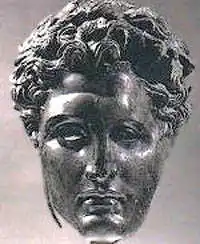 Hephaestion
Plutarch, probably the source Diogenes was using in this, tells the story with more words, but sums Alexander's affection for Aristotle thus:
NEXT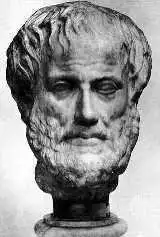
AristotleIntroductionAristotle's LifeTimelineAristotle's PoeticsAristotle's Cosmology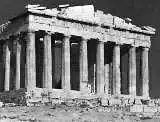
The Greek PhilosophersAbout CookiesMy Other WebsitesCREATION MYTHSMyths in general and myths of creation in particular.
TAOISMThe wisdom of Taoism and the Tao Te Ching, its ancient source.
LIFE ENERGYAn encyclopedia of life energy concepts around the world.
QI ENERGY EXERCISESQi (also spelled chi or ki) explained, with exercises to increase it.
I CHINGThe ancient Chinese system of divination and free online reading.
TAROTTarot card meanings in divination and a free online spread.
ASTROLOGYThe complete horoscope chart and how to read it.
MY AMAZON PAGE
MY YOUTUBE AIKIDO
MY YOUTUBE ART
MY FACEBOOK
MY INSTAGRAM
MY TWITTER
STENUDD PĊ SVENSKA
|
 Cosmos of the Ancients
Cosmos of the Ancients